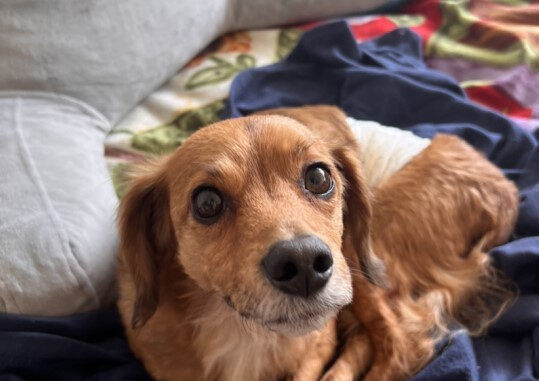
Isabella Abbott | Features Editor
Hugo, a disabled dog who lives at Duquesne, was hit by a car one day worrying his parents who weren’t sure if he’d make it. After waiting two long days in the ER with no improvements, Hugo miraculously survived his third day.
Though disabled pets are typically more work and require more care, recognizing disabled animals is becoming a more normalized phenomenon, in both the local Pittsburgh community as well as on campus.
Olliver Paddington, a disabled Virginia opossum from Pa. recently won a spot in the 2024 Walkin’ Pets Calendar.
The competition featured entries from 26 different countries and includes pets from all around the world using wheelchairs from the Walkin’ Pets organization.
Walkin’ Pets is an organization based in New Hampshire whose mission is to help people learn that there are alternatives to euthanasia.
According to their website, they believe that an elderly, disabled, or injured pet can often live a high-quality life for many years if they get the help they need, such as diapers or a wheelchair.
After suffering an attack as a small baby, causing major bite wounds, abscesses and a spinal cord injury, Olli, the opossum, was deemed “non-releasable” by his veterinarian due to his inability to walk normally.
He was brought to his now owner Berri, who saved him and loves caring for him and her other opossums.
Though he underwent months of physical therapy after the attack, he still couldn’t support weight on his back legs, meaning wheels were necessary.
So Berri reached out to a fellow rehabber whose opossum Kewpie passed away, and soon after, Olli received his very own wheelchair in memory of Kewpie.
Olli’s owner, Cheri Berri, said she was thrilled when Olli first received wheels allowing him to run and experience movement.
“The first time Olli had mobility in his wheelchair, I seriously felt such joy seeing him upright and not dragging his little body,” Berri said. “I have to admit, I teared up.”
Berri understands how important it is to give animals their lives back after an accident or injury. She said it’s “all worth it,” but it takes effort.
“Be ready for a lot of extra work, expenses and challenges,” Berri said.
Duquesne University student Korrine Averill has her eight-year-old disabled dog at school with her, and like Berri, she acknowledges the challenges and the joys of having a disabled animal.
Her dog Hugo was hit by a car two years ago and made a full recovery. At first, her parents weren’t sure that they could afford to save him.
“He was in the ER for two days, and he wasn’t making any improvements, and my parents were like, ‘We love him, but it’s really expensive,’ and I said, ‘Just give him one more day,’” Averill said. “And that day, he started walking and eating, and he came back home normal except wearing a diaper.”
However, a year later, he couldn’t walk.
“I woke up one day, and he just couldn’t walk anymore,” Averill said. “It was really hard in the beginning just to learn how to handle that because he was a dog that couldn’t walk or go to the bathroom on his own.”
Though Hugo was back at home for a while and Averill was in college, she decided to take him with her as an emotional support dog last year.
She said he loves it at Duquesne and is doing much better with her at school.
“I had him come live with me as an emotional support dog because I was really down in the dumps,” Averill said. “But when I have Hugo, I have to get out of bed because he needs me, he needs me to feed him, and he needs to be taken to the bathroom.”
Averill said he always makes her smile no matter what.
“He always makes me happy, always makes me laugh, and even though he can’t walk, he can still do all of those things,” Averill said. “It just takes a little extra effort, a little extra love, and I know that I’m making a difference for him.”
When Hugo was first hit, Averill’s mother put out flyers along the road asking who hit their family dog noting that it devastated six children.
At one point, someone came up to say the same thing happened to her family dog and said they’re always worth saving.
“They were like, ‘I can tell you that it is hard, but it is so fulfilling, it’s so worth it because you can still give them a good life,’ and I just really agreed with what they said,” Averill said.
Berri knows every pet deserves a good life, even if it takes a little extra time and care.
“I wholeheartedly believe that every creature deserves the best chance at life,” Berri said. “When an animal, no matter what species, is in our care, we have the responsibility to help.”
